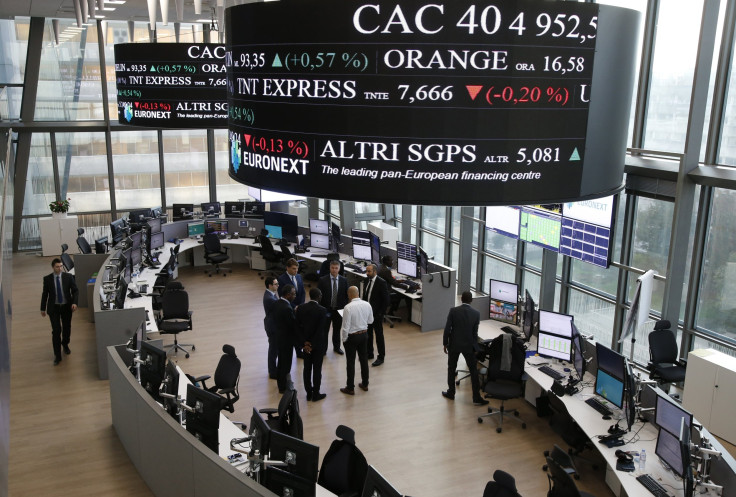Global Stock Markets Brace For Short-Term Jolt As Investors Mull Implications Of Paris Attacks

PARIS -- Global stocks are set for a short-term sell-off on Monday after Islamist militants launched coordinated attacks across Paris that killed 129 people, but few strategists expect a prolonged economic impact or change in prevailing market directions.
If anything, any initial damage to economic confidence, tourism and trade within Europe will likely reinforce the European Central Bank's resolve to easing monetary policy further next month, they reckon. That will keep pressure on the euro exchange rate and support other European asset markets.
President Francois Hollande has declared a state of emergency and set three days of official mourning after the attacks he called an "act of war" by Islamic State.
However, French financial markets will be open as usual on Monday, stock and derivatives exchange Euronext said on Saturday.
With many Parisian restaurants and shops shut on Saturday and Sunday, some local analysts expected any French equity reaction to be more visible than after January's attacks against the Charlie Hebdo satirical magazine and a Kosher supermarket.
"Stocks that are angled towards consumer goods or tourism, notably the luxury industry with the Christmas season, could be affected," said IG France analyst Alexandre Baradez.
"The January (attacks) were different, they were more targeted. Here they were aiming at an entire population," he added. "There may also be a purely psychological effect that pushes investors to stay on the sidelines until more clarity emerges."
Inevitable concern about similar attacks beyond France and tensions surrounding a stepped-up Western military response to actions of Islamic State point to some ripple effect around world markets.
"These Paris terrorist attacks and the larger scale of this attack could have a meaningful negative impact on the travel and tourism sector," said Robert T. Lutts, chief investment officer at Cabot Wealth Management in Salem, Massachusetts.
France has the largest number of tourists in the world and the sector accounts for almost 7.5 percent of GDP.
"Given that France has a big tourism industry there may be some damage to the economy if this leads to a fall in visitors to France, or in tourism in general after the crash of a Russian plane," said Hidenori Suezawa, financial market and fiscal analyst at SMBC Nikko Securities.
Outside France, the reaction will likely be more sporadic and few expect a jolt as significant as the hiatus after 2001's attacks that destroyed the World Trade Centre in New York City.
Analysts trying to put the event in some historical context say prior events like this in Europe over the past 15 years tended not to have any durable market or economic effects.
"As horrific as these events are – and this is truly awful – economic activity does tend to be pretty resilient," said Howard Archer, chief UK and European economist at His Global Insight. "The UK, Spain and France itself has all seen its economies little damaged by terrorist atrocities in the past."
Europe has suffered similar coordinated attacks on public transport systems in Madrid in 2004 and London in 2005. Almost 250 people were killed and more than 2,500 wounded in those bombings on trains and buses by Al Qaeda-inspired militants.
Shane Oliver, chief economist at Australia's AMP Capital in Sydney, said he expects only a knee-jerk impact on investments.
"History will tell us that if the economic impact is limited - and I think it will be - that markets will quickly recover and go on to focus on other things," Oliver, who is also head of strategy at the A$156 billion ($111 billion) wealth management firm, said.
SAFETY AND POSITIONING
Traditional safety plays into assets such as U.S. Treasury bonds would also go against the prevailing market trend that's in the process of discounting an interest rate rise from the Federal Reserve next month. With few expecting the fallout from the attack to be big enough to affect Fed decision making, any Monday move will likely be short lived.
"I sincerely hope these attacks will prove short in duration and will abate in intensity, in which case the market reaction will likely only include a brief safety bid in Treasuries," said Guy LeBas, chief fixed income strategist at Janney Montgomery Scott LLC in Philadelphia.
U.S. 10-year Treasuries notes US10YT=RR yielded 2.273 percent at Friday's close. The euro EUR= ended the week little changed at $1.0777, and is down 11 percent this year against a resurgent greenback.
Analysts at Citi say just the initial shock of the attacks may challenge extremely leveraged plays - such as heavy short positions in the euro or oil futures. But there was little reason to see that unwind be anything other than temporary.
"The market is heavily short euro and concerns are high any risk will trigger a short squeeze," they told clients. "We don’t think it will – and would sell into one if it appears. The attacks do not undermine the initial reasons for being short euro – or reduce the possibility of (ECB) action. Instead, they increase the likelihood of greater accommodation in our view."
While news of the attacks hit after markets closed on Friday, S&P 500 Index futures SPc1 were still trading and shed about 1 percent in light volume.
"If this had happened during market trading hours there could have been a panic but markets had a weekend to digest all the information," said Eiji Kinouchi, chief technical analyst at Daiwa Securities in Tokyo.
(Additional reporting by Tariro Mzezawa in New York; Nigel Stephenson in London; Writing by Mike Dolan and Lincoln Feast; Editing by Raissa Kasolowsky)
Read more at Reutershttp://www.reuters.com/article/2015/11/15/us-france-shooting-markets-idUSKCN0T402N20151115#J6UQmoPAcWAQiuYJ.99
© Copyright Thomson Reuters 2024. All rights reserved.





















